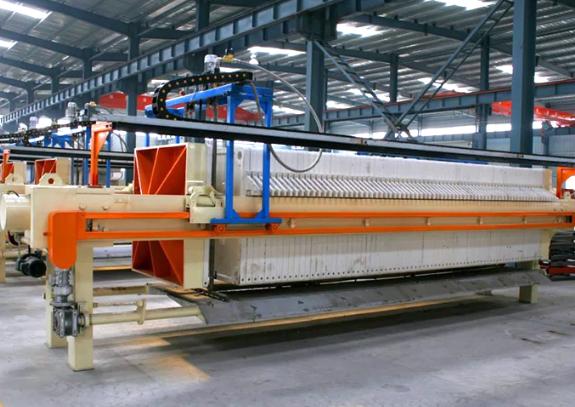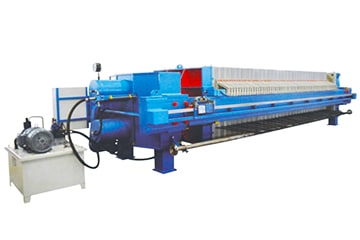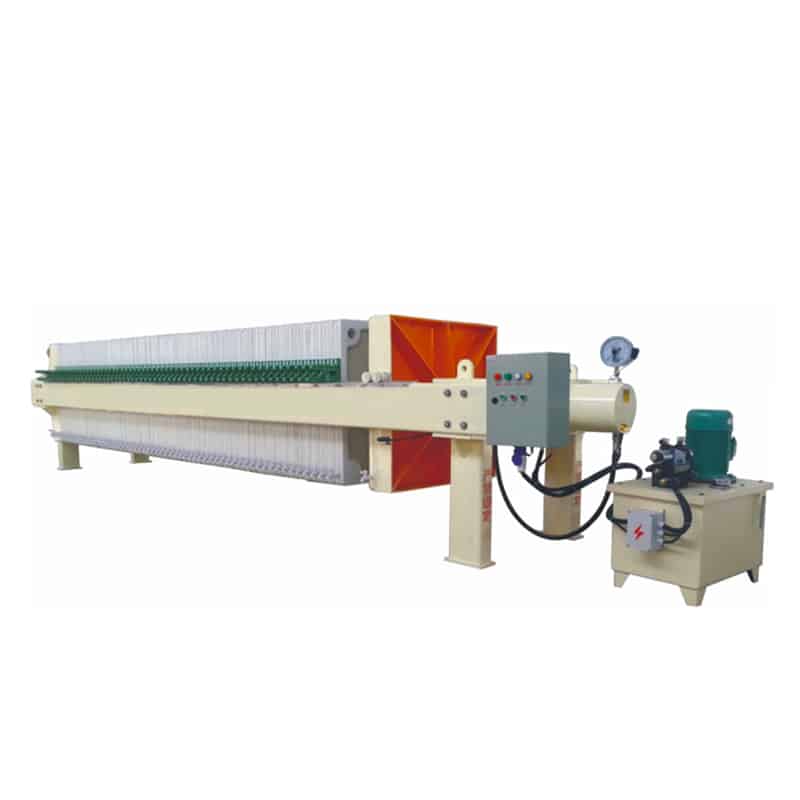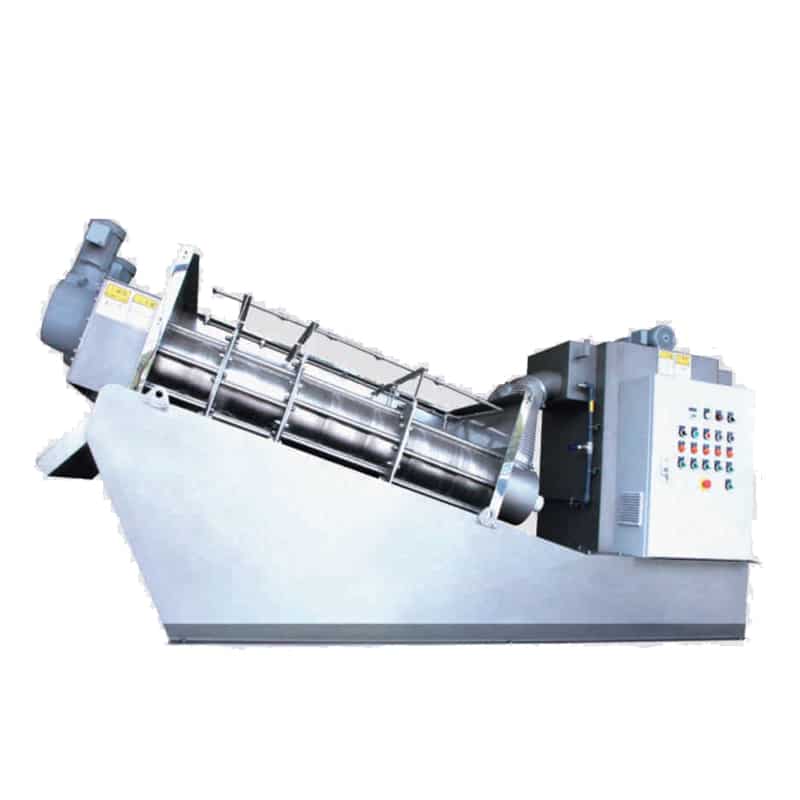The chemical industry, as an important part of the global economy, involves a multitude of production processes and procedures, of which solid-liquid separation is a common but critical aspect. In chemical production, there are many mixtures that need to be processed, in which solid particles need to be separated from liquids to ensure product quality and meet production requirements. Against this background, filter presses, as an efficient and reliable solid-liquid separation equipment, play an important role in the chemical industry.
What is a filter press?
A filter press is a solid-liquid separation device used to separate solid particles from liquid. It realizes solid-liquid separation by trapping solid particles in the mixture on the filter cloth through a series of filter media consisting of filter plates and filter cloths, thus forming a layer of solid material, while the liquid flows out through the gap between the filter cloths and filter plates.

Main components of the filter press
Filter plate: Filter plate usually made of strong plastic or metal with a series of neatly arranged holes. These holes allow filtrate to pass through, but prevent solid particles from passing through.
Filter cloth: The cloth that covers the filter plate and serves to filter and trap solid particles. The material and weave of the filter cloth can be selected according to the characteristics of the material to be treated.
Pressure system: Used to apply pressure to push the mixture through the filter cloth and cause solid particles to be trapped on the cloth.
Drainage system: Used to collect the filtrate and allow it to flow out of the gap between the filter cloth and the filter plate and out of the system.
Filter presses are usually categorized into two types: manual filter presses and automatic filter presses. Manual filter presses require the operator to manually operate the pressure system, while automatic filter presses are equipped with an automatic control system that allows for a higher degree of automation and continuous operation.
Filter Presses In The Chemical Industry
Wastewater treatment: Wastewater produced in chemical production usually contains a large number of solid particles and suspended solids, through the filter press can separate the solid particles from the wastewater, so that the water quality can be purified and meet the discharge standards.
Solvent recovery: The filter press can separate the reacted solvent from the solids, so as to realize the recovery and reuse of solvents.
Product extraction: Filter presses can help to separate and extract target substances to improve product purity and quality.
Catalyst separation: The filter press can realize the effective separation and recovery of catalyst, improve the reaction efficiency and catalyst utilization.
Solid product treatment: Filter press can separate these solid products from the reaction mixture or solution to get dry solid material.
Sludge treatment: Sludge produced in chemical production usually contains a large amount of solid waste, such as mud and sludge, etc. Filter press can dewater the sludge.
How do filter presses work?
- Charging stage: First, the mixture to be treated (liquid containing solid particles) is charged into the filter chamber of the filter press. The mixture passes through a uniform distribution on the filter cloth, forming a solid layer.
- Filtering stage: Next, pressure is applied, usually by means of a hydraulic system, which increases the pressure in the filter press. This causes the solids layer to become denser and forces the filtrate through the filter cloth, into the channels inside the filter plate, and eventually out of the filter press.
- Solids Separation: Solid particles are retained on the filter cloth, forming a layer of solid material. As the filtration process proceeds, the solid layer gradually thickens, while the flow rate of the filtrate gradually decreases.
- Washing (optional): After filtration is complete, it is sometimes necessary to wash the solids layer to remove impurities or solutes remaining on the solids. The washing process is completed by injecting washing liquid into the filter media and applying pressure again to push the washing liquid into the solids layer and then discharging it.
- Discharge Stage: Finally, the discharge device of the filter press is opened and the solid material is discharged from the filter cloth, usually in the form of lumps or cakes.
The filter cloth and filter plate of the filter press play a key role in the entire process. The filter cloth allows the filtrate to pass through, but prevents the solid particles from passing through, thus realizing solid-liquid separation. The filter plate, on the other hand, keeps the cloth stable when pressure is applied, ensuring that the filtration process is carried out efficiently.
Filter Presses for The Chemical Industry
Membrane filter press: The membrane filter press is based on the traditional filter press with the addition of membrane design, which is able to generate higher membrane pressure under pressure and improve the efficiency of solid-liquid separation. It is suitable for wastewater treatment, solvent recovery and other needs in chemical production.

Plate and frame filter press: Plate and frame filter press has a simple structure, easy to operate, and is suitable for sludge thickening, dewatering slurries, etc. It is commonly used for product extraction, catalyst separation, etc. in chemical production.

Screw press: Screw press utilizes a screw propeller to gradually compress the solid-liquid mixture, separating solids and liquids to mechanically dewater the solids and liquids. It is suitable for handling viscous materials such as sludge, slurry, etc. It is commonly used for sludge treatment and waste treatment in chemical production.

Automatic filter press: Automatic filter press is equipped with an automatic control system, capable of realizing automatic process control, filtration cycle adjustment, etc. It is suitable for continuous production needs in chemical production.
Pharma filter press: Specialized in the pharmaceutical industry, the filter press is made of stainless steel and designed to meet the requirements of pharmaceutical production, and is suitable for solid-liquid separation of medicinal liquids, medical waste, etc., in the pharmaceutical and chemical industries.
When selecting a filter press, you need to consider the nature of the materials in the chemical production process, the processing capacity, the operating environment and process requirements and other factors to ensure that the selected filter press can meet the actual production requirements.
Advantages of filter press Solid-liquid separation
- High efficiency:
- Good solid-liquid separation
- Adjustable pressure and filtration conditions
- Wide applicability
- Cost saving
Belt Filters and Filter Presses
Belt filters and filter presses are two common types of solid-liquid separation equipment, and there are some differences between the two:
| Specificitie | Belt Filter | Filter Press |
| Working principle | Filtration of mixtures by means of filter cloths or screens transferred onto filter belts. | Filtration by applying pressure to pass the liquid in the mixture through a filter cloth or plate. |
| Scope of application | Suitable for handling less viscous liquids | Suitable for treating liquids with high concentrations of suspended solids or large solid particles. |
| Capacity | Lower, but continuous operation can be achieved, processing | Has a high processing capacity and a relatively long processing cycle. |
| Operation complexity | Simple cleaning and maintenance with regular filter belt changes. | Regularly clean the filter cloth or replace the filter plate for conditioning |
Summary
Through the reasonable selection and use of filter presses, chemical enterprises can realize the efficient operation of wastewater treatment, solvent recovery, product extraction and other processes.
KUOSI is a company that specializes in wastewater treatment, wastewater monitoring, dosing and sludge effluent treatment, offering wastewater screen, low temperature sludge dryers, air flotation systems and ozone treatment, contact us for customized services.
